Lea Wait's Blog, page 95
December 31, 2021
Weekend Update: January 1-2, 2022
 Happy New Year Everyone!
Happy New Year Everyone!
Next week at Maine Crime Writers there will be posts by Kathy Lynn Emerson/Kaitlyn Dunnett (Monday), Kate Flora (Tuesday), Brenda Buchanan (Thursday) and Maggie Robinson (Friday).
In the news department, here’s what’s happening with some of us who blog regularly at Maine Crime Writers:
Earlier this week, we shared some other writers’ thoughts on great first lines. Here are some of ours, as well:
John Clark:
Don’t know about the greatness, but here’s the first line from “Don’t Say It.”
Marcy-Jo Parmenter kicked the log she was sitting on and scowled. So much of life was unfair and no matter how hard she tried to deal with what frustrated her, solutions seemed just out of reach.
Matt Cost:
In regard to my own books, I’m sort of partial to: She should’ve taken an Uber. From Mainely Money. Simple and to the point.
For other authors, I was always liked Robert Parker’s The Godwulf Manuscript. The office of the university president looked like the front parlor of a successful Victorian whorehouse.
Susan Vaughn:
I love the idea of first lines. Here’s mine from ALWAYS A SUSPECT, and a link to the book on Amazon. A short book description is here also.
“Marie Claire Saint-Ange didn’t look like a woman who could murder three men.”
A persecuted widow thinks the P.I. she hired will clear her and protect her. Instead he’s a federal agent who came to this coastal Maine town to uncover her darkest secrets-and maybe arrest her. But her gentle soul makes him long to believe in her innocence. Fighting her attraction to the rugged investigator, the widow can’t risk losing someone she cares about. Not again. Never again.
Link: http://getBook.at/Always-a-Suspect .
Kate Flora:
I’ve always worried about this, the opening line from The Angel of Knowlton Park, but when I was writing the book, I took it out, fearing it might put readers off, but it insisted on being put back in, and it is the perfect opening to a story that begins with a murdered child in a Portland park on a stinking hot summer day:
The fat, blue-black fly circled lazily in the July heat before landing in the child’s open eye.
https://www.amazon.com/Angel-Knowlton-Park-Burgess-Mystery-ebook/dp/B07QMF99FH/ref=sr_1_1?crid=2TZ8VECECW45S&keywords=The+Angel+of+Knowlton+Park&qid=1640732516&sprefix=the+angel+of+knowlton+park+%2Caps%2C84&sr=8-1
Charlene D’Avanzo:
Here’s the first line from Demon Spirit, Devil Sea – book two in my Maine Oceanographer Mara Tusconi series.
“A cocktail of fear and fury bubbled up from my belly ad coated my tongue – taste of cold metal.”
A reminder that there will be a “Win a Book Wednesday” this week, so be sure to drop in and see what we’re offering.

Berries after the freezing rain
An invitation to readers of this blog: Do you have news relating to Maine, Crime, or Writing? We’d love to hear from you. Just comment below to share.
And a reminder: If your library, school, or organization is looking for a speaker, we are often available to talk about the writing process, research, where we get our ideas, and other mysteries of the business. We also do programs on Zoom. Contact Kate Flora
December 29, 2021
In praise of good long books
My town had by all accounts a very succesful community read this year — an event in which everyone (who wants to) reads the same book. A variety of discussions and events are built around it, and it lasts for months. I’m a member of the library trustees, and as we discuss what to pick for next year’s read, several people from around town have suggested that whatever the book is, it hass to be shorter.
The book we read in 2021 was 500 pages. Yes, that’s longer than the average book. But I can’t get my head around the complaint that a book is “too long” based simply on the amount of pages. My response to the “shorter book” suggestion is “Can’t people just pretend they’re reading three books in a row?” Usually that’s met with polite smiles. People think I’m making a joke. I’m not. I really mean it. Because what do you do when you finish a book? You start another one. So what’s the difference if a book is 300 pages or 500?
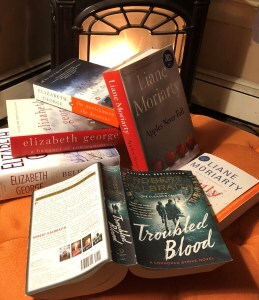
Reading a good long book in front of a fire on a winter day, what could be better? More good long books!
I’m not afraid to admit the fact that I love a long book. I’m anxiously awaiting the latest Elizabeth George (release date Jan. 11!). Her books are generally 600-900 pages, and the new one, “Something to Hide,” clocks in at 704.
I also anxiously await the next J.K Rowling (writing as Robert Galbraith) C.B. Stryke book. They roll in at 900-plus.
I couldn’t put down Liane Moriarty’s “Apples Never Fall,” recently. Literally (almost). I read it over a 24-hour period. Granted, it was a modest 480 pages.
I recently bought an “e-book” that’s actually all 14 of P.D. James’ Adam Dalgliesh mysteries, so it’s like reading a 7,000-page book. I’m on page 1,167.
My love of long books doesn’t just go for mysteries. I love Dickens. Now, there’s a guy who packed a lot of pages. And my well-worn copy of “Jane Eyre,” while only 495 pages because the type is wicked small is definitely a good long book.
When a book is good, I don’t want it to end. That’s how it should be, right?
I know publishers, especially these days, count pages like every single one is money out of their pocket. Becasue it is. Paper is expensive. The more pages, the expensive it is to print the book. That’s why Elizabeth George and J.K. Rowling can get away with writing books that are three times longer than the rest of us. The publisher knows the books are instant best sellers and they’ll get their money back.
The three books in my Bernie O’Dea series were all 95,000-96,000 words — a little more than 300 pages. My writing process is to get around 120,000 “first-draft” words down (or more if the book I’m writing now is any indication), but I don’t fool myself that makes it a good book. I know the much shorter book is in there somewhere and I have to go back and sculpt it out, shedding words as I go.
I’ve read plenty of books were the author (or their editor if they’re luck or smart enough to have one) didn’t do that. That’s what makes a “long book,” no matter how many pages it is. So do unlikable characters, boring plots and bad dialogue. Among other things.
I love a good long book, with the emphasis on “good.” If a book pulls you in the way it’s supposed to, you shouldn’t want to leave. I relish a winter weekend where I have nothing to do, so I can sit in front of a fire and do nothing but read a good long book. Or a summer day on the porch.
When my mechanic explains to me why my car goes through so much oil, intellectually, I know what he says makes sense on some level. But as hard as I try I can’t grasp that level. I roll it around in my head, trying to get it to hit that place where the lightbulb goes on and it all makes sense, but it never does.
The “too long book” thing is similar. I realize there are people who don’t enjoy reading as much as some of us do. I don’t understand the belief that a book of a certain number of pages, no matter the topic or quality, is “too long.” What happens when you finish reading a book? You generally look around for another one to read, hopefully one that’s as good. So how is reading one that’s like reading two or three books a problem?
I understand that one of the points of a community read is to get everyone reading and talking about books. A large amount of people think it makes sense that a shorter book will make people like books more. I’ve tried to roll that one around, get it to hit the lightbulb switch, but it hasn’t. Yes, I get people don’t enjoy reading. But I still don’t understand the number of pages affecting their enjoyment one way or another. Yes, I understand it obviously does. That it’s less that they have to endure or whatever. But I still don’t understand it.
In any case, I’m not going to waste any more time thinking about it. I’m too excited about the new Elizabeth George. Guess I’ll have to take a break from the 7,000-page P.D. James-fest. Then, when I’m done with them, I guess I’ll have to find something else to read. I can’t wait.
December 28, 2021
The Importance of a Great First Line
Dear readers:
Today, we 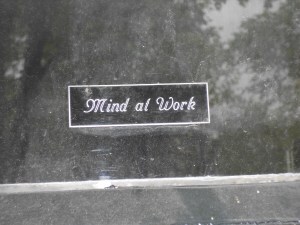 share some responses to a Facebook question: Please share a favorite first line from your book or someone else’s. Kate Flora lead off with the opening line from Led Astray: Burgess wished he could have slapped the little shit silly.
share some responses to a Facebook question: Please share a favorite first line from your book or someone else’s. Kate Flora lead off with the opening line from Led Astray: Burgess wished he could have slapped the little shit silly.
What makes a first line work? What draws you in? Please add your favorites in the comments, and keep an eye on our weekend updates and our Facebook page, where interesting questions for you may pop up.
Terrie Moran First line of Well Read, Then Dead: “Oh, pu-leeze, Rowena, Anya Seton never measured up to Daphne du Maurier’s elegance. I’m shocked you would say such a thing.” Jocelyn Kendall, pastor’s wife and book club gadfly, crossed and recrossed her legs in perfect tempo with the ever-increasing meter of her rant.”
Dottie MacKeen Geneva Sweet ran an orange extension cord past Mayva Greenwood, Beloved Wife and Mother, May She Rest with Her Heavenly Father. Bluebird, Bluebird – Attica Locke
 Earl Brechlin The light is different in the north, far above Bangor, up beyond Greenville in the realm of townships with numbers rather than names, where moose outnumber people, where thundering double-trailer logging trucks reign supreme on tracks of dirt, dust billowing behind them like the wake of a nameless ship fading across the surface of a deep and unexplored sea. (Earl didn’t attribute this, but inquiry reveals it is from a forthcoming book of his nonfiction)
Earl Brechlin The light is different in the north, far above Bangor, up beyond Greenville in the realm of townships with numbers rather than names, where moose outnumber people, where thundering double-trailer logging trucks reign supreme on tracks of dirt, dust billowing behind them like the wake of a nameless ship fading across the surface of a deep and unexplored sea. (Earl didn’t attribute this, but inquiry reveals it is from a forthcoming book of his nonfiction)
Sandra Neily “Where’s Papa going with that ax?” said Fern to her mom as they were setting the table for breakfast.” Charlotte’s Web, E.B.White
Mary Ellen Hughes First line of Scene of the Brine: Bang!
Rick Helms First line from VICAR BREKONRIDGE: “Had Edward Drummond worn a thicker, heavier overcoat, he might have lived.”
Joyce Tremel First line from TO BREW OR NOT TO BREW, the first book in the Brewing Trouble series: “If looks could kill, the plumbing inspector giving me the bad news would have been in big trouble.”
Hank Phillippi Ryan From Air Time: It’s never a good thing when the flight attendant is crying.
Les Roberts First line of my first novel, An Infinite Number of Monkeys: My ficus benjamina was dying.
Valerie Lentz Horowitz “Christmas won’t be Christmas without any presents!” (Amy, Little Women.)
Robert Lopresti “On my naming day when I come 12 I gone front spear and kilt a wyld boar he parbly ben the last wyld pig on the Bundel Downs any how there hadn’t ben none for a long time befor him nor I aint looking to see none agen.” – Russell Hoban, RIDDLEY WALKER
LynDee Stephens Walker Julia Spencer-Fleming still holds my “best first line ever” trophy. From IN THE BLEAK MIDWINTER: “It was a hell of a night to throw away a baby.”
Polly Iyer From Hooked: If Linc rated high-priced call girls on a scale of one to ten,  Tawny Dell would score a twelve.
Tawny Dell would score a twelve.
Katie Caprero “I poisoned your drink” from Duane Swierczynski “The Blond”
Gretchen Asam How about Anthony Burgess’ Earthly Powers? “I was in bed with my catamite when the archbishop came to call.”
Vicki Lane From my ART’S BLOOD — second of the Elizabeth Goodweather books. “I still see the bed — its wide white expanse floating like a snowy island on the deep pearly carpet — the creamy tufted silk coverlet neatly folded back — the soft heaped pillows, their pale lace soaked and stiff with her blood.”
Laurie Graves From my own “Maya and the Book of Everything”: “The first time Maya Hammond saw the man who didn’t smile, she and her mother, Lily Turcotte, were on a train going from Boston to New York.”
Susannah Charleson From my next book, Puzzle wakes me with her going.
A favorite by someone else: Erik Larsen’s DEVIL IN THE WHITE CITY: How easy it was to disappear: A thousand trains a day entered or left Chicago.
December 26, 2021
The Best Gift, Revisited … and Humans Together

Ice setting up on Moosehead Lake
Sandy Neily here. It’s December 26th and I am thinking of what might feel joyously human (now that we are headed into some Covid hibernation again) and also a Christmas family moment to revisit, written as an assignment to “go deeper.”
First, joyous somethings.
I know Flash Mobs might feel out of date, but as we head into more months of missing the joyously human when we are together, I have been watching them. They are an UP. So here’s some holiday ones and the last one is an affirmation of country: an affirmation that might matter more because of the woman and the silent statue.
Christmas Flashmob moves to tears – YouTube
Christmas Food Court Flash Mob, Hallelujah Chorus – Must See! – YouTube
Sound of Music | Central Station Antwerp (Belgium) – YouTube (From 2009 but still my fav.)
Woman Sings The National Anthem At Lincoln Memorial In Washington, D C [June, 2016] – YouTube
*********(I posted this in 2018)
“Try letting yourself out through another’s eyes.” Our Bread Loaf Writers Conference instructor/author (2010) tells us she wants a short, short story about something that deeply affected us, told in the point of view of someone else. She says our work merely skirts human emotion and we must go deeper.
She quotes Robert Frost who was an early and frequent teacher, presenter, and mentor at our Bread Loaf Writers’ Conference. “No tears in the writer, no tears in the reader. No surprise in the writer, no surprise in the reader.”
So I called up my daughter’s voice and channeled my last real family Christmas (in 2005)—through what I thought might be … her eyes.
********************
THE BEST GIFT
When I pull into the driveway I count five cars parked in the first winter snow next to the stone wall under the pines. The camp’s green walls are holiday card perfect with wispy flakes on sills and roof. I see that Mum has, as always, tucked red bows into pine branches hanging from window boxes. Red, green and white. So it’s going to be a traditional Christmas is it? 
Wood smoke blows low across the deck, pushed by a bad-weather-wind toward the lake where ice is rattling in small rafts of cubes. One morning we will wake and find the cove glued into ice- hard silence. It could happen that fast. Lots can happen that fast. Overnight.

No tracks; everyone’s been inside for hours unwrapping presents, eating Mum’s coffee cake, probably made with berries she froze last summer anticipating weekends of blue-flecked muffins and family Scrabble games. Sam, the youngest nephew, is probably walled inside a castle of toys and gifts and well on his way to an early afternoon breakdown from getting too much of what he wants.
And what do I want? I want this to be over. I want to crawl into the bed I’ve had since I was two, pull Pooh Bear under the covers with me, and when I wake up, find my father on the roof, shoveling great clots of snow into a mound I will make into a snow cave.
Before I can get up the stairs to that Christmas wish, I have to open the door—to what?
Will we be pretending today? After fifteen years of camp family holidays, that seems likely.
They hear the front door and spill into the front room to hug me. The chaos is familiar and washes over me like a bright wave of welcome water.
“What took you so long?”
“How were the roads? Icy?”
“We saved all our Annie presents to have Christmas part two with you!”
“Look at all the dragons I got. They’re on the floor breathing fire on each other. Some just got killed.”
I look around for Mum The living room floor is awash in paper, ribbon, half chewed dog toys and plates of cake crumbs. There’s a monument of a tree in the living room, easily over ten feet tall and it looks like every light and ornament is out of storage and propped on its limbs. My aunt is setting the long dining room table with the traditional red cloth, and my grandmother is attempting to settle Sam with a story. 
The walls of pictures are rearranged. My Dad is missing except for early baby pictures of us together. There are no pictures of my parents together. There’s a lighter space on the wall where my dad’s tarpon used to hang over the bar counter. I wonder how long it will take for the wall’s fish outline to disappear into the smoke darkened panels beside it. I wonder what new wall he’s put it on and what new people are looking at it now.
I climb up to drop my bag in my small room at the top of the stairs. Mum has put the Santa music box on my bedside table. I wind it up to hear its familiar holiday song: “you better not cry” in tinkling tones. As Santa revolves, his serious eyes meet mine for a few seconds in each turn. “You better not cry.” This is the first time I’ve been home since I lost my family. Nothing has changed in my room; pictures of us together sit on my bureau and bookcase. Sitting on the bed I can sort out the smells of roasting turkey and simmering garlic from the spicier ones of pumpkin pie. 
Mum must be in the kitchen, but then suddenly she is there at my door. She might look the same to her family. I can see the effort she’s made to be dry-eyed and energetic, but I think she looks too pale, even for winter. She’s made no effort to re-color the grey wisps at her temples, and under the apron she’s just thrown on an old T-shirt that’s inside out.
She hugs me and sits on the bed. “If you don’t want to, we don’t have to do this anymore,” she says. “It was too late to change it this year.”
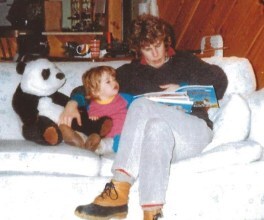
In a long ago Christmas, listening to Aunt Mary read.
I nod. “This will be our last Christmas like this,” I say firmly. “It’s over.”
“Let’s make a new tradition when we get this sorted out,” she sighs. “Everyone’s waiting for us to open your presents. Let’s go down.”
“Mum.” I lean on her. “I love you.”
“I love you too, Anne. You are the best gift that I ever got.”
And since she has said that to me with tears in her eyes on every birthday and every Christmas, just as she’s saying it today, I feel stronger. We hold hands and climb down the stairs.
**************************
Author’s note: Pictures illustrating this story came from my family albums.Sandy’s debut novel, “Deadly Trespass, A Mystery in Maine” won a national Mystery Writers of America award, was a finalist in the Women’s Fiction Writers Association “Rising Star” contest, and was a finalist for a Maine Literary Award. The second Mystery in Maine, “Deadly Turn,” was published in 2021. Her third “Deadly” is due out in 2022. Find her novels at all Shermans Books (Maine) and on Amazon. Find more info on Sandy’s website.
December 24, 2021
Weekend Update: December 25-26, 2021
 Merry Christmas Everyone!
Merry Christmas Everyone!
Next week at Maine Crime Writers there will be posts by Sandra Neily (Monday), Dick Cass (Tuesday), and Maureen Milliken (Thursday). We’ll be taking Friday off for New Year’s.
In the news department, here’s what’s happening with some of us who blog regularly at Maine Crime Writers:
An invitation to readers of this blog: Do you have news relating to Maine, Crime, or Writing? We’d love to hear from you. Just comment below to share.
And a reminder: If your library, school, or organization is looking for a speaker, we are often available to talk about the writing process, research, where we get our ideas, and other mysteries of the business. We also do programs on Zoom. Contact Kate Flora
Brothers in Kind

They were passing acquaintances. The older man would nod when he saw him crossing the road, or when they met in the man’s orchard. He sensed an aura of sadness whenever they crossed paths and had once overheard the retired farmer tell the mailman how difficult and painful his wife’s struggle with cancer had been. While he didn’t understand nearly as well as the mail carrier, he grasped how wrenching the loss of a long time mate felt. After all, he’d lost his when a speeding driver ran her down the previous spring.
When the farmer stepped out of his shed with a saw over one shoulder, he was curious enough to follow. Lights had started appearing on nearby houses the week before, signaling the start of the Christmas season. He remembered the man making a similar trek with a saw two years ago when his wife was still well enough to decorate their porch and the evergreen tree in the living room window. Maybe he’d recovered enough interest to find a tree once again.
He remained out of sight as the old farmer wandered along the stone wall separating a wooded hill from the apple orchard that still bore delicious red apples every fall even though none of the trees had been pruned in years.
He waited until the man started up a narrow path through half a foot of fresh snow before following, moving closer when he was certain the man couldn’t see him. The farmer’s tracks wandered from tree to tree as if looking for the perfect one.
When he heard the man exclaim “yes”, followed by the zip of a blade cutting through softwood, he backed away from the trail, hoping the farmer wouldn’t notice a second set of tracks running alongside his. A moment later, the farmer passed by, a small balsam fir trailing in his wake.
He was about to follow the man along the stone wall when he saw him stop and drop the tree and saw while looking at his left hand.
“Dammit,” the man cried, frantically searching his pockets. “Why didn’t I have the brains to wear gloves. I’ll never find it in the snow.”
It didn’t take an empath to realize the farmer must have lost something very important to him, but what? He thought about times he’d seen the farmer up close. Did he remember anything he couldn’t see now? Yes, the gold band he always wore on his left hand wasn’t there. Its significance escaped him, but the fact that this was the first time he hadn’t seen it on the older man’s finger made him suspect it might have fallen in the snow somewhere between the house and where the tree was cut. Losing it made sense, as the farmer had become a lot thinner since his wife died. Maybe there was a connection between the metal band and his late wife. He watched the man pick up the saw and slowly drag the tree back to the farmhouse.
He could smell more snow coming as darkness began to fall. If he was going to locate the lost band, finding it would be a lot easier before everything was buried under another foot of the cold white stuff that made winter so challenging. He turned around and started searching.
He stopped twenty feet from where the tree had been cut, sensing something under the packed snow where the man had stomped his feet to keep them warm. He sniffed, sniffed again and began digging into the packed snow until he caught a dull flash as the gold band flipped loose, tumbling to the side.
He picked it up and retraced his way to the stone wall, hesitating momentarily before continuing across the orchard and over the small frozen meadow until he reached the road. Satisfied no cars were coming either way, he scampered across and walked up the stone steps to the red door leading into the house.
Now what? He wondered. Lights were on in the kitchen and living room, but he couldn’t see movement in either room. After waiting for a while, he decided it was time to do something risky, so he uttered three sharp barks and sat facing the door.
When the farmer came to the door with a puzzled look on his face, he opened his mouth, letting the lost wedding ring fall on the top step.
“Blessed Virgin Mother,” the farmer whispered, looking from his ring to the fox on his doorstep. “How did you know, how did you find it?” He stopped, remembering finding the dying female fox that spring and how he’d tried to comfort her. He’d buried her body on the hillside across the road. “You understand grief and loss, too, don’t you fox.” He put the ring on his left hand. “Wait here,” he said turning and going to the kitchen.
“I was going to have this for supper, but losing my wedding ring left me with no appetite. You sure deserve it for returning the best memory of Hilda I still have.” He set the still warm roast chicken on the stone and waited until the fox picked it up and started walking toward the road. “Merry Christmas, little friend.”

December 22, 2021
A Peculiar Thing
Kaitlyn Dunnett/Kathy Lynn Emerson here, today ruminating about a very peculiar thing that’s happened at our house. As regular readers of this blog know, I haven’t been writing anything new lately, both because I am not currently under contract anywhere and because I’ve been busy editing a three-volume collection of all the novels and short stories in my historical Face Down series. As a result, my muse was also taking a break.

statue of a muse
Apparently, she got bored. She abandoned my first floor office for a more congenial location one flight up.
It took me a while to notice. When I first conceived the idea of publishing The Valentine Veilleux Mysteries, three short stories and a novella, as an original e-book and a print-on-demand trade paperback, I wasn’t sure I wanted to bring out such a short book. One possible solution was combine that short fiction with the stories my husband had written about Bobby Wing, an eccentric Mainer who encounters mystery and murder in Dallas Plantation, a real place in the county where we live. There were five stories extant at that time. Two of them (“Devious Doings in Dallas” and “Daybreak Dismay in Dallas”) had been published in collections of Best New England Crime Stories (Red Dawn, 2015 and Windward, 2016).
After we talked, Sandy decided he’d like to make some changes before publishing anything else. For one thing, he wanted to switch the stories to a fictional setting, which would necessitate changing all the titles. He also had an idea for a new story. I moved on with what I was doing. It wasn’t until a few weeks later that I noticed that he was spending a lot more time than usual in his second-floor office. Turned out he was busily revising and rearranging the order of the stories he’d already written and had started to write more.

He has a new goal in mind—a novel-length book made up of connected short mysteries. The next thing I knew, he was spending hours at a time doing new writing. Even before he finished the story he’d been working on, he had an idea for an entirely new one. All in one day, he wrote the rough draft, revised it by hand that evening in front of the TV, and went back into his office for another three-hour session at the computer to input changes and make new ones. The other day he asked me if there was any way to make the muse shut up. Seems she woke him several times during the night, forcing him to get up and write down ideas before he forgot them. I sympathized, but had to tell him that there is no known way to silence a determined muse. He’s accepted that now. On Monday of this week, when he went skiing at Saddleback, he spent his lunch break sending e-mails to himself so he’d remember ideas that came to him while he was on the slopes.
There is no escape. The muse has well and truly attached herself to him. Since I’m happily occupied with my own projects, neither of us really has any complaints, although I do find it a bit disconcerting that he’s named the muse. He calls her “Kaitlyn.”

Kathy Lynn Emerson/Kaitlyn Dunnett has had sixty-four books traditionally published and h self published others, including several children’s books. She won the Agatha Award and was an Anthony and Macavity finalist for best mystery nonfiction of 2008 for How to Write Killer Historical Mysteries and was an Agatha Award finalist in 2015 in the best mystery short story category. She was the Malice Domestic Guest of Honor in 2014. Her most recent publications are The Valentine Veilleux Mysteries (a collection of three short stories and a novella, written as Kaitlyn) and I Kill People for a Living: A Collection of Essays by a Writer of Cozy Mysteries (written as Kathy). She maintains websites at www.KaitlynDunnett.com and www.KathyLynnEmerson.com. A third, at A Who’s Who of Tudor Women, is the gateway to over 2300 mini-biographies of sixteenth-century Englishwomen.
The Good Bad Guy – A Christmas Story
Kate Flora: As I’ve done for the past three years, I’ve written a Christmas short story for you. Hope you enjoy it. The earlier stories, if you’re curious, can be found at http://www.kateclarkflora.com
Hugh Lawson would be the first to admit that he was a bad guy. Not even ashamed of it. He was a proud bad guy. An accomplished thief—he preferred thief to burglar, it seemed classier—and one who had striven, despite the risks of his craft, to do it well, leaving as little harm as possible in his wake.
There were those who would say that taking others possessions did, by that very fact, do harm, but Hugh had always chosen his targets with care. He did not steal from the struggling single mom or the elderly. Rather he considered himself kind of a Robinhood figure, a redistributer of wealth, except that he didn’t usually give to the poor, except to his own poor self. Which was okay. A man had to live and a roof overhead, some food in the cupboards, and a reliable truck weren’t too much to ask, especially from those who had more than enough.
But now it was Christmas, the season of giving, and for the first time in his nearly forty years, Hugh Lawson was feeling a twinge of sentimentality. He was trying to figure out why.
Was it the two Covid years when most everyone was forced to live more secluded, fearful lives? People had become like animals in their winter dens, poking fearful faces out to see if it was safe to emerge. All that effort to stay safe had been exhausting. Errands quick and furtive. Gatherings curtailed. Smiles mostly hidden behind masks, leaving only the crinkling around their eyes to show warmth or merriment. As if in response, to raise people’s spirits, there was an abundance of holiday lighting around. Yards were littered with inflatable Santas and snowmen and sleighs. Plastic deer wound with lights when there were plenty enough real deer already.
Was it possible his sentimentality was actually stirred by all those gaudy lights?
It didn’t seem likely. Mostly the Covid years had made his job much harder and his bank account much leaner. People—rich people or the very comfortable—weren’t traveling as much. City people were hunkering down in their weekend or summer houses, leaving them less vulnerable to his predations. All the resultant stress ought to have made him more bitter and cynical, and yet despite all that, he was feeling a touch of Christmas spirit.
If he were to examine himself carefully, he’d have to conclude it was that damned little girl. The girl who wasn’t supposed to be there.
With the cupboard getting bare and his bank account dwindling, he’d chosen his target house carefully. A mini-mansion with a three-car garage and two expensive cars inside, along with a boat that probably cost more than all he had stolen over the years. He’d studied the family’s movements, their patterns, when they came and went and who was in the household. He’d watched them drive the family dog—the obligatory golden retriever—to be boarded while they were away. He’d watched the dad load luggage in the honking big Lexus SUV and skiis on the roof. Watched the trim, blonde mom load a cooler into the back seat. He’d watched the two children, a tween girl and a teen boy, climb in the back, the parents climb in the front, and the whole family had driven away to spend the holiday week at their ski house.
The light from the kids’ individual tv screens was already a bluish glow in the back seat before they were out of the driveway.
Now their house was all his. He could choose his day without worrying about someone waking up or getting up to use the john. He’d had that happen. Of course he had. He had more than two decades inside other people’s houses. It was almost eerie sometimes, waiting there in the dark, watching some unsuspecting homeowner walk right past him, never for a second suspecting he was there. He’d wondered how they felt when they discovered they’d been robbed. Did they wonder whether it was happening while they made that sleepy trek to the bathroom? Was their sleep forever uneasy after that? Hugh wasn’t afraid of the dark because he was the thing that went bump in the night.
Once in a while, those quiet nocturnal invasions dished up something more interesting than a somnolent adult stumbling to the toilet. Once he’d slipped into a closet, leaving the door open just a crack, and seen a gorgeous young blonde, stark naked with hair almost to her ass, teetering down the hall in a pair of scarlet, feathered mules. It had taken willpower not to sigh in appreciation. He didn’t think he’d ever seen more perfect breasts.
Another time, the homeowner, a mid-thirties guy clearly addicted to the gym, had done a similar parade of male pulchritude. That hadn’t done anything for Hugh except provide a slight nudge toward taking better care of himself, a nudge that had come in handy when a not at all sleepy homeowner had chased him with a handgun and Hugh had needed a burst of speed and some strong arms to get himself over a fence and away.
Once, in a slightly decrepit mansion, he’d found a tipsy matron sitting in the dark, in a room illuminated only by a blazing fire. She’d looked up when he came in, given him a wave, and said, “Sit down and have a drink with me.”
Even in her late sixties, she was beautiful and she’d dressed up for her evening of drinking by the fire in a silver skirt and a black velvet jacket. Her Scotch was good and her stories of her very adventurous life even better. She’d started out as an aspiring actress in New York City. Found she could support herself better as the mistress of a prosperous business man, and he’d kept her in fine style until he died. They’d traveled all over the world together, to places both exotic and scary as well as cities like Paris and London. The man’s wife didn’t like to travel and didn’t mind if her husband traveled with his mistress. When her benefactor died, he’d left her this mansion and enough money to keep her for the rest of her life.
She was getting older now, his friend Cora was. No longer traveling much and without a family, awfully alone in the world. He worried about her living by herself but when he’d voiced his concern, she didn’t want to hear it. “I’ve always taken care of myself, Hugh,” she said, “and I’d hate to have people fuss over me like I’m an old lady.”
For years they’d had the tradition that sometime during the holiday season, he would break in, and they would spend the evening drinking and talking by the fire. She always had a new story and loved to hear about his adventures in the world of housebreaking. Recently, he’d been breaking in more often. It was his way of keeping an eye on her. The last time, back in October, she’d seemed sadder and more fragile, and told him that he didn’t need to pick the lock, he could just ring the doorbell. It felt like some kind of capitulation to aging and he hated to see it.
Since October, he figured he’d have to break in more often than once a month. Who else was going to keep an eye on her? She had a cleaner who came in, but the woman was very much an employee and not a friend. He couldn’t see her worrying about Cora the way he did. Was it absurd or just a part of his rather alternative life that he’d been the one who installed nightlights throughout the house and insisted that she get a cell phone and keep it charged and with her at all times?
Unlike his ongoing relationship with Cora, most of his adventures were one offs, small things that stayed with him. The funniest thing that had happened had been the time a guy absentmindedly peed in the closet Hugh had been hiding in, right on Hugh’s feet. Hugh almost always left his shoes by the door. It was quieter in his stocking feet. He’d helped himself to some excellent stuff on his way out. He figured he was owed. And careless as it was, he left his urine-soaked socks in their kitchen trash.
A close second, in his world of funny adventures, was the time a small boy took his hand, said, “Daddy, I can’t sleep. Read me a story,” and Hugh had read the boy back to sleep. That was the closest Hugh had come to being a parent. The randomness and risks of housebreaking were not compatible with being a family man.
It wasn’t an entirely worry-free business, for all that he relished it. Sometimes behind the facades of wealth and comfort, he found empty rooms and a vast pretense. Other times, despite the elegant finished exteriors of the houses, he found shocking squalor, the dirt and the smells putting him off even trying to steal. He was a bit fastidious and wouldn’t have wanted those people’s possessions anywhere near him. More than once, despite his diligent prep work, he’d found a dog inside. The vicious ones were scary but even a sweet-natured dog could make a lot of noise.
The hardest was the time he’d watched a stealthy father heading for his young daughter’s bedroom, the man’s bad intentions clear from his face even in dim light. It had taken all of Hugh’s self-control not to act, not to ruin his own life along with the father’s.
When that father had disappeared into the girl’s room and closed the door, Hugh was ready to beat feet out of there, but after that frozen moment, he couldn’t. He’d known he had to act, whatever the consequences, so he pulled his balaclava down to cover his face, and stepped into the room. Hugh was not a small man and he pulled himself up to his full height and spread his arms wide as he said, in a deep voice, “Leave her the fuck alone!” That sent her father scurrying out again.
He waited a moment, watching, until the father had returned to his bedroom. Then he saluted the girl, said a quiet “good night” and headed for the stairs. She followed him to the door, whispering “Thank you” as he slipped away. Despite the risk that the man might have called the police, he took the time, downstairs in the garage, to leave a note on the father’s windshield that said: I know what you’re doing. Stop it or the cops will know, too.
Also on the way out, he’d helped himself to a few things from the man’s study, things he hadn’t meant to take, including a fancy watch, a thumb drive he was sure had child porn, plus an unopened bottle of Pappy Van Winkle. He’d always wanted to try it. When he took a drink later, to celebrate getting out of there unscathed and to settle his nerves, he thought it was overrated.
The next morning, he’d watched when the father left for work. The man had clearly read the note, because he kept looking in the rearview mirror like he was expecting a cop car any moment. Hugh could only hope the note had worked. The note and the scare he’d given the man. He’d always wondered. And worried a little. He’d checked out the thumb drive, and he was right about the kiddie porn, so once a year he sent the man a note, reminding him he was being watched. There wasn’t much else he could do without disclosing who he was or how he knew. But in the moment when he and that little girl had exchanged looks, he’d felt a kinship. She’d been so calm, finding a guy in a black mask in her room. Maybe balanced against being assaulted by her father, a masked man chasing her father away wasn’t so scary.
If he were of an authorial bent, he could write a heck of a memoir about his escapades. The things people collected. The way they lived. Not, unfortunately, without incriminating himself. Sadly, that would have to wait until he was old and the statute of limitations had run.
He was already feeling the years. All those hours crouching in his truck, scoping out jobs had been bad for his back, and the tension and sudden bursts of anxiety had ruined his digestion and his nervous system. According to most measures, he was in the prime of life, but sometimes these days he felt old and spent and wondered how he could go on doing this for another thirty years. It made him sympathize with cops. A little bit, anyway.
Despite his late mother’s repeated admonition that he should learn himself a trade, he’d resisted. Now he didn’t have many other skills to fall back on. Not unless some company would hire him to break into people’s houses to see how secure they were, like software companies did to check the security of their firewalls. He had done a brief stint working for an alarm company, so he did have some expertise in that department. He’d learned how to disable them and that installing those systems wasn’t how he wanted to spend his life. Whatever the toll it took on him, he couldn’t imagine a life without the planning, the anticipation, those jazzy jolts.
He pulled his thoughts away from body aches and memory lane and back to the house. He knew to avoid the ring doorbell, with its ever watchful camera. He knew which outside lights had motion sensors and which inside lights were on timers and when those lights went out. He knew where on the street to park, in the driveway of another empty house, where his truck wouldn’t be illuminated by street lights. This house was going to be his holiday gift to himself. These were the kind of people who had nice electronics, good jewelry, and stashes of cash around “just in case.”
A few times, he’d noticed a ratty black Corolla that also seemed to be watching the house, but he’d dismissed it once he saw that the driver was a tired-looking young woman
with a child seat in the back. She wasn’t the type to be scoping out a robbery, he was sure of that. Probably a cleaner waiting for it to be time for the next job.
Two a.m. was the time he’d chosen. It was the quietest time of the night. Few people coming back from parties and too early for early workers to be heading out. Police patrols in this neighborhood were on a clockwork schedule. It was going to be a very dark night, the moon rising late and only a sliver, and the weather was mild and dry.
At one-thirty, Hugh went to his closet and searched through the collection of uniforms he’d bought at Goodwill. Plumber or electrician? Which was more likely at this hour? He settled on plumber. Anything involving rogue water was definitely an emergency.
He’d never been able to find a shirt with “Hugh” on the pocket—maybe all the plumbers were Joes and Guys and Toms—so he’d had his name put on one of the Goodwill ones. It always made him feel a little bit special when he buttoned on that crisp green shirt with his name on the pocket. A foolish vanity, perhaps. If he was caught, he’d be better off claiming to be Bob or Joe. He always carried a false ID when he was on a job. Matching green pants and as a concession to the likelihood that they’d turned down the heat while they were away, he had a green vest. Cotton, not nylon. Nylon clothes rubbed against things with annoyingly loud sounds. Puffy vests tended to catch things and pull them off shelves.
In his garage, he got the magnetic sign for “Lawson’s Plumbing” and stuck on the truck door. Then he drove off into the night, looking forward to his next adventure. If he’d listened to his intuition, that little voice that said, “Don’t. Something’s gonna go wrong. Abort! Abort!” none of this would ever have happened. The voice had kept him out of trouble many times. This time, he ignored it.
He parked in the driveway and carried his bags—empty but purporting to hold plumbing tools—across the street and around to the side, where a door led into the garage. He’d unlocked it a few nights ago, and a quick test with his gloved hands told him the homeowner hadn’t relocked it.
Inside the garage, he found the fuse box and disabled the alarm system. He might not have studied for a trade, as his mother wished, but a number of his friends had gone to trade school, and they’d been generous about teaching him what he needed to know to be a successful housebreaker, as had his former employer.
Quietly, he let himself into the house, shedding his shoes by the door. Once or twice, he’d had to leave so quickly he’d left his shoes behind. Not a big deal. He always wore a new, cheap pair a size larger than his own. His real shoes would wait for him in the truck. Yes, it could be pretty unpleasant rushing through snow, ice, or rain in his socks, but far less unpleasant than going to jail.
He paused after removing his shoes to listen to the house.
Silent except for the normal mechanical hums.
Two things, though, were surprising. First, the house was warm. Most people—even the well-to-do—turned their heat way down if they were going to be away for any length of time. Second, it smelled of baking. Again, while people might bake something to take away with them on a trip, the family had been gone for at least twelve hours, while this smelled like freshly made chocolate chip cookies.
It had been a while since he’d had one of those. The smell reminded him how hungry he was. He could never eat before–? Before what? A gig? A caper? That was it, a caper. That put a light hearted spin on it, though the reason he didn’t eat was because he always got so nervous that if he ate, he’d throw up. He was sure the cops had a way of tracing people through their vomit. Not that he was in anyone’s system. Through a combination of caution and luck, he’d never gotten caught. Still, every time he left home on a caper like this, he was aware that it could be his last.
He stayed by the door until his eyes had adjusted to the dark. This family had a lot of nightlights around, and those, plus the glow from so many appliances and devices gave a fair amount of illumination.
Hugh had a system. He’d start upstairs, then do the downstairs and be gone. Over the years he’d gotten very efficient. He knew the best places to look, where people hid things, and where they’d simply stashed them sorta kinda out of sight, like a roll of bills or expensive jewelry in the back of a dresser drawer. He headed up the stairs to the master bedroom.
He had his hand on the doorknob when he heard a rustling behind him. Turning, he saw a small girl in pink footie pajamas. She had a mass of golden curls and a few red creases in her cheek from sleep. He wasn’t very good at guessing kid’s ages but he thought maybe she was four. She was staring up at him with a teary face. “Where’s mommy?” she asked.
He froze. There wasn’t supposed to be anyone here, and certainly not a small child and her mother.
Where was mommy? Who was mommy?
“Downstairs baking cookies for Santa,” he said, holding out his hand. “Come on, let’s get you back to your bed.”
“It’s not my bed,” the small girl said, taking his hand. “I’m just borrowing it. Mommy says we aren’t doing any harm and it’s better than living in the car.”
Oh damn it. The ratty Corolla? The tired woman with the child seat in the back, the one who’d seemed to be watching the house? Scoping it out like him but with a different purpose?
“Do you live here?” the girl asked. “Are you going to throw us out or call the police?”
Not very likely, Hugh thought, seeing his plans crumbling. If he followed through with his caper, he’d be putting the woman and her child at risk. True, they’d already put themselves at risk by being here in someone else’s house, but squatting, or unauthorized housesitting, was a far lesser crime than stealing the owner’s possessions.
He squelched a frustrated “DAMMIT!” and let the girl lead him back to a bedroom.
The room was a sweet pink extravaganza, perfect for a little girl. Just not for this little girl.
Then he heard a voice calling, “Carly? Carly, honey, are you talking to someone?”
“Mommy!” said the girl, running for the door.
Hugh followed at a slower pace. He didn’t want to scare the woman. She might scream and then where would they be? True, the houses here were farther apart, as befitted a street of mini mansions, but on a quiet night the sound might still carry. There might still be members of the three a.m. club, those whose sleep was always interrupted by their thoughts and worries. The guilty. The women with hot flashes. The casual partners who’d spent the night but wanted to be gone by dawn.
From the hallway, he heard the girl say, “Mommy, I found a man in the hall. He was putting me back to bed.”
That brought the stern admonition, “Carly, you stay right here,” and hasty footsteps. The woman from the Corolla threw open the door, blocking it as much as she could with a small and slender body. She glared at him, her eyes fierce. “Who are you?” she demanded.
“I might ask you the same question,” he said.
A standoff while they stood and stared at each other.
“Your daughter is perfectly safe,” he said, adding, “From me, that is. Though it seems we are each spoiling the other’s plans.”
“I was so careful,” she said, tears spilling from her eyes. “I just wanted Carly to be somewhere warm and nice for Christmas. We were at a shelter but . . .” Her breath caught. Then she said, like somehow she felt safe confessing to a fellow criminal, “But there was a man who kept looking at Carly . . . and I knew that look.”
It came to him then, looking at the small woman in the doorway. Something about the eyes, and her upright stance. And he knew.
It hit her at just the same moment. “You!” she said. “My God! It was you, wasn’t it, who stopped him? Stopped my father from coming to my room. I was . . . I’ve been . . .” She looked down, then back at him. “I’ve always been grateful to you for that. Because he stopped. Some people let it ruin their lives, what he did. I was determined not to let that person be me.”
Her eyes fell to the carpet again. “And yet look at me. Alone with a small girl of my own and it’s Christmas and not only do I have nothing to give her, I can’t even keep her safe.”
People put so much pressure on themselves when the social safety net fell apart. He knew about that from his own family and friends. His father violent. His mother helpless, always hoping for rescue instead of trying to rescue herself. Now his parents were both gone, nothing but rotten memories and nagging voices in his head.
Now what was he supposed to do? He could take them, this mother and small girl, back to his place, but his place was small. Enough for him, because it had a garage, but not big enough for three.
“I’m sorry,” he said. He was. Sorry for spoiling her plans. Sorry that his were also spoiled.
“It’s not your fault,” she said. “It’s almost funny, you know, how we both found this place. How our paths crossed again after so many years. I really have always been grateful.”
But not grateful for having to leave the temporary sanctuary she’d found.
“You don’t have to leave,” he said, sadly kissing his financial fix goodbye. “I’ll leave. You can go ahead like you planned.”
He watched her consider the idea, then reject it. “It won’t feel safe,” she said.
An instinct. And he knew about instincts. Like the one that had told him not to come here at all.
Then he thought about Cora, all alone in that big house. Maybe she’d enjoy some company at Christmas. She’d often lamented the fact that her “arrangement” as she called it, had precluded her from having a family.
“I might have a place for you to stay,” he said. “Do you mind waiting in your car while I . . .” He stopped. Couldn’t bring himself to say aloud, “While I finish my caper.”
Silently, she nodded, though her face was heartbreakingly sad.
“Let me make a call.”
Cora was surprised to hear from him, he could tell that from her voice. Even though he’d often visited her at early hours like this. She said she never slept. She was also lonely, as she immediately said, “When are you going to come by? I’ve been hoping—”
Soon, he thought. His Spidey sense was telling him to hurry things up. That something was about to go wrong.
“How would you feel about some houseguests for a few days? A mom and a little girl who have no place to go?”
She started to temporize, wanting time to think about it. A long time loner. Not used to being spontaneous.
He was never abrupt with her but tonight there was no time for a casual approach.
“It’s kind of an emergency,” he said. “Even if you could take them just for the night, until I can fix up something else.”
Another hesitation. He could feel time, and the night, slithering away like a basket of eels. And danger, some kind of danger, getting closer. But Cora didn’t like to be pushed. He could only go so far.
At about the point where he was ready to say to hell with her and take the woman and child back to his place, Cora cleared her throat.
“If it’s important to you, Hugh, I’ll do it.”
And so he told the woman to gather her things and her daughter, helped her take them out to the car, and gave her directions to Cora’s house.
“I’ll be along as soon as I can to get you settled.”
His sense that everything was about to go wrong was now more like a clanging bell than a niggling sense. Still, after they departed, he took a few quick minutes to search through the master bedroom. He was rewarded with an envelope full of money, a small cloth bag with what had to be a thousand dollars’ worth of jewelry, an expensive watch, and a handful of easy to sell small electronics.
He was heading into the garage when something made him pause. He opened the envelope, took out the money, and stuffed into the inside pocket of his vest. There in the bottom of the envelope was a tiny tracking device. That made him wonder about the easy availability of the watch, so he left that, and the envelope, on the counter. The rest of the stuff left with him.
He got as far as the garage when he heard a scratching sound, and something like a low moan. Something like a dog. But he’d seen them take the dog to the kennel, hadn’t he? He tried to think back. Had they had more than one dog? Could they possibly be the kind of people who would leave a dog behind?
He wouldn’t be surprised. Disappointed, yes, but people’s behavior disappointed him all the time.
When he let himself out of the garage, locking the door behind him, he heard the sound again, and then a nose was pressed up against his leg. A dog. Their dog or someone else’s dog, or an abandoned dog. He didn’t know. All he knew was that he had to get out of here, and it looked like the dog was coming with him before it could make a fuss. He could deal with the difficulties of a canine companion later.
Hugh, with the dog happily sitting in his passenger seat, was heading down the road in his van when two police cars went tearing past him. Trust your intuition, it reminded him. That voice he’d almost ignored was there to save his ass.
As soon as he found a place to turn off and park, he changed his shoes, pulled the sign from his door, hid his loot inside his spare tire, and changed from his vest and work shirt into a sweater and an oversized parka. He needed the parka’s warmth right now. He was shaking and his heart was pounding so hard he could barely drive.
By the time he got to Cora’s he was a basket case. Was this a message from the universe that it was time to change his ways, even if he had no idea what another way might be?
Cora and the woman—he realized he’d never learned her name—were sitting by the fire sipping something rich and brown in small elegant glasses.
“Carly’s gone to bed,” the woman said.
Cora left her throne-like chair and came and hugged him, something she’d never done before. She looked regal in something dark red and velvet. After the hug, she pushed back and studied him. There was nothing faded or feeble in her look. “Thank goodness you’re okay. I was worried when Sarah told me what happened,” she said. “Want something to drink?”
Sarah. Now he had a name.
“Need something to drink,” he said, dropping into his usual chair. “Missed getting caught by the cops by a hair.”
He looked around the room, a room he’d visited so many times, nearly always in the dark of night until recently. He was surprised to see a Christmas tree, decorated and draped in old fashioned lights, including ones that had always been his favorites: bubble lights. As Cora handed him a generous pour of bourbon, he looked at her for illumination.
“You’re not the only one with a sixth sense, Hugh,” she said. She settled back into her throne and the dog, which he couldn’t bring himself to leave in the truck, settled down at her feet.
“A woman, a child, and a dog?” she said. “Hugh, what’s gotten into you?”
“Maybe it’s the holiday spirit,” he suggested. “People do get lonely at Christmas.”
She laughed. “And maybe I’m the only friend you’ve got.”
Which wasn’t true. Hugh had a number of friends. What he didn’t have was family. This odd grouping—an aging beauty, a homeless mother and child, and a professional thief, plus what looked, now that he saw it in the light, to be a homeless dog—was just the right kind of family. A found family, made from odd parts.
“The only family I’ve got,” he corrected, and it felt just right.
December 21, 2021
The Guy on the Train, Part 1
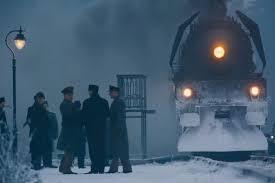
The subject of trains has been a popular trope for many mystery authors. From THE GIRL ON THE TRAIN to THE ORIENT EXPRESS to STRANGERS ON A TRAIN, trains have proved to be a fascinating vehicle to set a thriller novel. Why is it we have such a fascination with trains? What is about them that so captures our imagination?
My own love of trains began a long time ago. It wasn’t toy trains that caught my attention, but the locomotives that clattered past my house. As a kid, I was mesmerized by the sight of these empty containers barreling down the track. When parked in the yard, we would often climb in and explore these cavernous metal boxes, only to get chased away by the engineers and maintenance men. We would place coins on the steel tracks and watch as the trains crushed them into flat, thin spheres.
In high school I took the subway train into school and work every day. Known as the T, these trains would transport me to most anywhere in Boston I wanted to go. I would first take the Red Line and get on at Quincy Square. The tracks were powered by the daunting third rail, electrified and lethal to the touch. Once I reached Downtown Crossing I switched over and took the elevated Orange Line, getting off near the Pine Street Inn. The old, creaky Orange Line is no longer there, replaced by a sleeker version of orange travel. The old South End was a downtrodden, beat-up neighborhood with lots of crime and dire poverty. The nearby Cathedral housed the Cardinal. The Red Fez was a venerated culinary institution, the fragrant smell of shish kebabs and baba ganooj filling the air. Today the South End is one the most fashionable and gentrified neighborhoods in Boston.
In college I got off at Park Street station, which was partially located at the end of the Boston Commons. Park Street was always a source of entertainment and inspiration, part travel depot and part street circus. A hub of sorts located within the Hub of the Universe. Located on multi levels, it was a place where all manner of human behavior could be seen—and smelled. Singers and guitarists used the platform as their platform for future greatness: Mary Lou Lord, Shawn Colvin, G Love and Special Sauce, to name a few—have performed in MBTA stations. Large crowds would gather around these musicians until their train arrived. Then after the train departed, the buskers would start to grow another appreciative audience, the sounds of their voices echoing throughout the station.

On too many occasions people—many inebriated—would fall onto the tracks and clamber back up. Or not clamber back up and suffer an unlikely demise, delaying commutes for hours on end. The rats that scurried along the rusted rails resembled footballs with tails. Mentally challenged people frequently stood along the platform singing and talking to themselves, and I always stayed clear of them in the event some murderous thought suddenly came over them. Many future stories presented themselves in this oddly eccentric situations.
From there I would go upstairs and catch the Green Line. College students predominated on this level. Boston College students took the B line to Chestnut Hill. BU students took the same line but got off at one of the earlier BU stops. Located on Commonwealth Avenue, a student could get off at any number of stops along the way, depending on where their class was located on Commonwealth Ave. I took the E line to Northeastern, which was the first stop on Huntington Avenue after emerging from the tunnel. The campus was located right cross the street and within easy walking distance. I purchased my coffee from the food truck, which was poured in one of those iconic blue cups with the Greek letters scrawled over it, then made my way to class.
Of course that was when I wasn’t taking the Red Line to Cambridge. I used to love coming out of that station and arriving onto the busy Harvard Square, where punks, drunks and roundabouts of all kind used to hang around. There was a great German deli called the Wursthaus on the corner, but it’s long gone. Oh, and there was the best outdoor newsstand anywhere, back when newspapers were required reading. And let’s not forget Steve’s Ice Cream and the unforgettable Border Cafe, where many a night was spent sipping cervezas and wolfing down tacos after viewing some artsy foreign film.
For awhile there I could take the Cleveland Circle Line and get off at St. Paul’s. Again, it was the first stop after coming out of the subway tunnel. But then my brother moved away and that line dried up to me. Except when I was going to the Coolidge Corner theater to catch BLUE VELVET in 70mm. The Blue Line was the line I used the least, if at all. Apart from Santarpio’s pizza, why even go to East Boston?

Riding the T was, and still is, a rich source of entertainment. Throughout the years, the skyline have changed just as much as Boston has. Yet I can still see the red brick, Mary Ellen McCormack housing projects in South Boston where my mother grew up, which was also in the same building as Whitey Bulger. I can still see the JFK Library and the harbor off in the distance. And the painted oil tanks with Ho Chi Minh’s profile hidden in blue paint. Oh, and the old Boston Globe plant on Morrissey Boulevard.
Thankfully, I don’t have to take the T every day like I once did because I live in Maine and we don’t have a subway system. Besides, public transportation does have its considerable downsides. There were the constant delays and breakdowns. The thefts and violent crime, panhandlers and overcrowded trains. Many days I had to wait long periods of time for the next train to arrive. In Japan they hire people to push people into the train so the doors could close. In the summer the stench inside these trains was often unbearable, especially when crammed with hundreds of other cantankerous and overheated commuters. Then there were the days of waiting on the platform in sub zero temperatures, frostbite nipping at the heels. Seats were a luxury, few and far between, and I frequently stood for the entire ride home. And if there was an open seat it usually went to the old lady named Dottie from Dorchester. When I was sixteen, me and a bunch of other kids got hired by the T to shovel out all the tracks after the Blizzard of 78 buried everything.
I still think about my days riding the T. If you’ve ever lived in Boston, riding the T was at some point an integral part of your life, some days good, some days not so much. There was nothing like riding the T to Kenmore Square before an important Red Sox game. Or heading toward it after the Sox had won. There was nothing like taking the train to the elevated station alongside the old Boston Garden for a Bruins or Celtics games. Conversely, getting in a late night train with a bunch of drunken, sore Boston Bruins fans from Southie presented a unique challenge.
There’s a scene in the TV show, HOUSE OF CARDS, where Frank Underwood pushes journalist Zoe Barnes into on oncoming train. Riding the T all those years, an untimely ending like that was my worst nightmare. Thankfully, it never happened. Of course you obviously know that because here I am writing this. But the mere thought of such a gory demise planted a lot of sinister ideas in this author’s mind.
With that said, Merry Christmas.
See you on the T.
Joe

December 17, 2021
Weekend Update: December 18-19, 2021
 Next week at Maine Crime Writers there will be posts by Charlene D’Avanzo (Monday), Joe Souza (Tuesday), and Kaitlyn Dunnett/Kathy Lynn Emerson (Thursday). We’ll be taking Friday off for Christmas but John Clark will be posting a new Christmas story.
Next week at Maine Crime Writers there will be posts by Charlene D’Avanzo (Monday), Joe Souza (Tuesday), and Kaitlyn Dunnett/Kathy Lynn Emerson (Thursday). We’ll be taking Friday off for Christmas but John Clark will be posting a new Christmas story.
In the news department, here’s what’s happening with some of us who blog regularly at Maine Crime Writers:
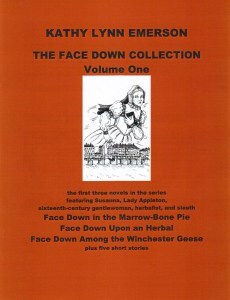 from Kathy Lynn Emerson: The first collection of Face Down novels and stories in now available as an 834 page e-book. Here’s the link to buy The Face Down Collection, Volume One from Amazon. It’s also available for Nook and iBooks and through Kobo and other distributors. It contains the first three novels featuring Susanna, Lady Appleton, sixteenth century gentlewoman and sleuth, an expert on poisonous herbs, and five short stories connected to the novels. At $9.99, this is a significant savings over buying the novels separately. Volumes Two and Three will follow next year to finish collecting all the novels and short stories except the three Mistress Jaffrey novels written as a spin-off series and still in print.
from Kathy Lynn Emerson: The first collection of Face Down novels and stories in now available as an 834 page e-book. Here’s the link to buy The Face Down Collection, Volume One from Amazon. It’s also available for Nook and iBooks and through Kobo and other distributors. It contains the first three novels featuring Susanna, Lady Appleton, sixteenth century gentlewoman and sleuth, an expert on poisonous herbs, and five short stories connected to the novels. At $9.99, this is a significant savings over buying the novels separately. Volumes Two and Three will follow next year to finish collecting all the novels and short stories except the three Mistress Jaffrey novels written as a spin-off series and still in print.
Kate Flora: A few Christmases ago, I decided my treat to our loyal MCW readers would be to write a holiday story. As I embark on this year’s story, here’s a link to my first holiday story: https://kateclarkflora.com/a-christmas-story/

Stay tuned to our Win a Book Wednesdays. Starting in mid-January, we’ll be having some great giveaways to our readers. Also more interviews with our stellar team of writers.
An invitation to readers of this blog: Do you have news relating to Maine, Crime, or Writing? We’d love to hear from you. Just comment below to share.
And a reminder: If your library, school, or organization is looking for a speaker, we are often available to talk about the writing process, research, where we get our ideas, and other mysteries of the business. We also do programs on Zoom. Contact Kate Flora
Lea Wait's Blog
- Lea Wait's profile
- 506 followers



